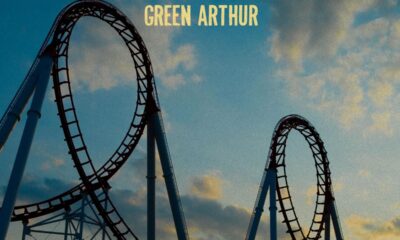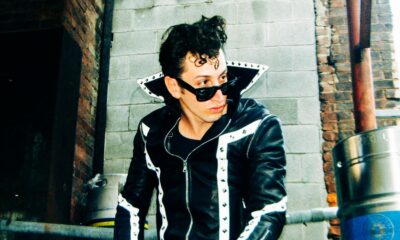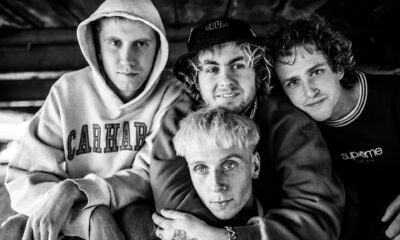Interviews
BODYWASH Discuss Their New Record ‘Comforter,’ Being Musicians in Montreal, and ARCADE FIRE
We recently spoke with Montreal indie band Bodywash about their new Luminelle Recordings record Comforter, living in Montreal, Arcade Fire, and why the album took two years to finish.

Mmmm….. The sweet smell and feel of body wash… Who can resist it? Well, not us, which is why we bring to you today a new interview with the Montreal dream pop band Bodywash. We caught the quintet at a good time because they are just preparing for the August 30th release of their new album Comforter via Luminelle Recordings (pre-order now via BandCamp).
With a meticulous mix of shoegaze, trip-hop and IDM, Bodywash have created a fun debut record that’s best suited for listeners of Beach House, Deerhunter, MBV and Slowdive. A massive amount of time and effort was put into the crafting of Comforter, with the band members spending roughly two years on the writing and recording process alone. The results certainly speak to the time and effort put into Comforter as Bodywash have delivered a worthy introduction to their own take on dream pop.
Formed in 2014, Bodywash came to be when singers and guitarists Chris Steward and Rosie Long Decter started jamming away in a rehearsal room while both were at Montreal’s McGill University. What helped them bond was their shared affection for shoegaze and dreampop which fostered a chemistry that translated itself well into music. Tom Gould later joined on bass and the lineup was rounded up by second guitarist Rian Adamian and drummer Ryan White.
And an EP was released in 2016 before others started to take notice, such as Austin Tuffs of Braids who helped produce some of Comforter. In an in-depth conversation, we learned a lot more about Bodywash from both Decter and Steward where we discussed their new record Comforter, the artistically creative motivation provided by living in the city of Montreal and why it took so long for this album to see the light of day.
Hear the band’s latest single “Reverie,” that’s off the new album Comforter:
It’s a fairly generic interview question but we had to ask… Where did the name Bodywash come from?
Rosie Long Decter: I wish we had a better answer. We used to go by a different name and we knew we wanted to change it, but all of our ideas were terrible. We were brainstorming for about four months, I would open our group chat on Facebook to like 200 messages, each just a one-word name suggestion from our bassist Tom. Eventually, we were all hanging out one day and I was scrolling through my Facebook feed and just saying words I saw. There was an ad for shampoo, so I said “shampoo,” and then I said “bodywash.” And we all sort of nodded and went “bodywash.”
Chris Steward: I always thought it came from a grocery list that was just conveniently lying around at the time.
Decter: Sadly, no, it was definitely Facebook.
While we’re on the topic, do you have a current favorite “body wash?”
Decter: I don’t! My roommate usually buys the bodywash for our house, but I’m open to bodywashes of all scents and styles!
Steward: Anything with coconut oil in it! But when we eventually get around to making Bodywash-branded body wash that’ll probably be my favourite.
Playful questions aside, Bodywash formed about five years ago and is the brainchild of Chris Steward and Rosie Long Decter. You started jamming together and you pretty quickly found a shared chemistry between you both. At what point did you know that this was going to become something larger than just messing around on some instruments?
Decter: I was actually just thinking about this, how there was never really a moment where Chris and I said “let’s be a serious band.” The motivation always came from the songs themselves, if we had songs we were proud of, then we wanted to record them properly. That’s how Comforter, our debut record happened. We had these songs that we wanted to do justice to, and so it made sense to put them together as an album and try to make something that we were excited to have out in the world.
Steward: I’m still not totally sure if we’re doing something larger than messing around on some instruments.
Comforter, is due out on August 30th, via Luminelle Recordings. Check out the cover art:
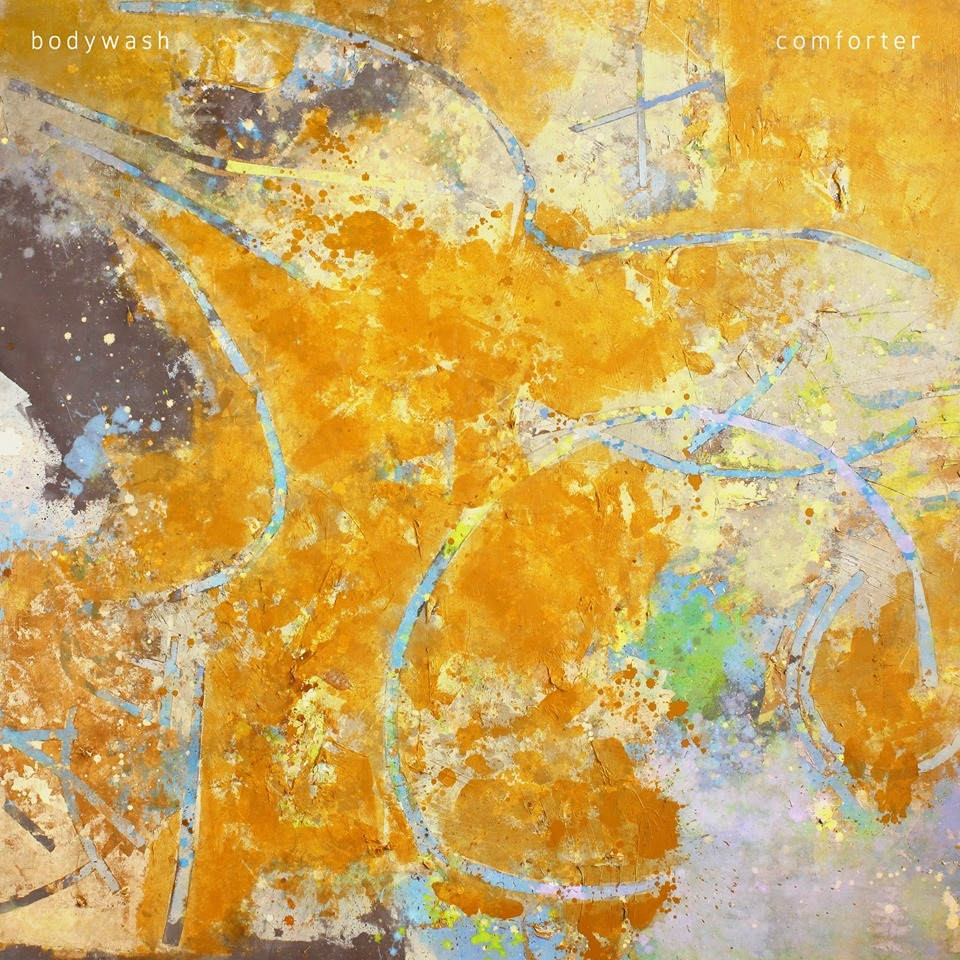
Now when you first started jamming, it was at a basement rehearsal room at McGill University in Montreal. This sounds eerily similar to the formation of the now world-renowned Arcade Fire. What is it about McGill’s environment that encourages musical inspiration in people?
Decter: I think we got lucky at McGill because I lived in the only residence that had a jam space, which definitely enabled us to get things going right from the start. I will say, though, that I think it’s more about Montreal than McGill. Montreal is a great city to be an artist in because it’s so livable and there’s so many arts communities here. So I think a lot of people, myself included, come to Montreal knowing that space for art and music exists, and really want to make the most of it.
Steward: I would agree that it’s more the environment in Montreal than McGill specifically. I tend to view McGill as a pressure cooker filled with a bunch of students from all around the world. After a few years of getting cooked at a high temperature, the culture of apathy that’s created can lead to some people finding some interesting creative outlets.
I went to university in Toronto, exactly around the same time as the formation of Arcade Fire and I’ve always been curious about this. Is the band still revered around the halls, dormitories and general environment of the campus? For instance are there stories of “this is the room where Arcade Fire first started writing their EP” or “this is the dorm room where Win Butler lived?”
Decter: I’m not sure about stories like that but I do remember that literally the first week we were at McGill, Arcade Fire played a surprise secret show promoting Reflektor, and you had to dress up in a costume to get in. I remember thinking it was very cool, and also that I was too lazy to actually go. Probably a bad decision.
Steward: I went, waited in line and promptly gave up. The dress code was “fancy dress” which means something very different in England, so I think I turned up in a clown costume or something and felt very out of place among the velvet-clad masses. Apparently, the family that lives next door to Rosie was blasting “Wake Up” at 7 am on St. Jean Baptiste Day this year, though, so that’s something…
To share something older with you, listen to Bodywash’s “Nothing At All:”
Back to Bodywash now. It’s an exciting time for you as August 20th marks the release of your debut album Comforter. It hasn’t been an easy road to this record, as the writing and recording process spanned roughly two years. What do you think the primary reason for the holdup was in finalizing this record?
Decter: There were a lot of factors. One of the big ones is that we were still in school when we started recording it, so we didn’t have the time or money to really invest properly in the album. The whole thing moved a lot faster once we graduated. The other problem is that we’re perfectionists, Chris more than me, but we were both really picky about the mixing process. Austin (Tuffs) and Taylor (Smith) from Braids, who mixed the album, were really patient with us. They put so much care into making sure that the final mixes conveyed our vision for the album, which we’re really thankful for.
The writing and recording was also very spread out. It wasn’t like we sat down and decided to write and record for a month. The songs happened here and there, and our sound and dynamic as a band changed a lot over the course of the two years. Which has the danger of making the record seem less cohesive, but I think is also a cool thing, in that you can hear us growing alongside the album’s progression.
Steward: Yeah, just to echo what Rosie said, the process by which Comforter became this tableau vivant was purely accidental. I tend to see it now as an artifact from a time in which we were making a specific kind of music, and that time was very much intertwined with a lot of personal development for us. The perfectionism definitely didn’t help either and we basically only let perfectionists work on the project!
When you started writing Comforter, what were your main goals for the album and how did those goals change as the time went by?
Decter: Well, we had already done an EP in 2016, which was sort of a trial run at capturing our sound, and I think for our debut album we wanted the sound to feel more mature and also more varied. Our first EP was pretty straight up dream pop, but on the album, we wanted to bring in electronic, shoegaze, and trip-hop influences too. So we wanted it to feel like an evolution from our previous work, and then of course the album itself became a process of evolving over the two years we spent making it.
Steward: I’m not sure if we had a clear goal in mind before making the album, but I think it ended up being about reformulating dream pop in our own image. I was seeking out all sorts of tangential musical influences throughout the making of the album and that led to me growing quite a bit as a producer. Consequently, you can hear all sorts of production flourishes on the album: guitars that sound like synths, synths that sound like guitars and amorphous drones that glue everything together. I was hoping that these would result in a record that was dream pop at its core, with a sound that was distinctly our own.
Listen to more of what’s to come on Comforter with the track “Eye To Eye:”
Writing music is not easy but it’s also not that difficult to fall into a process of trying to make things maybe too perfect or overproduced. Did you ever fear that you were perhaps falling into that?
Decter: Definitely, but I think we tried hard to keep an organic feeling in the album too. Most of our songs come out in bursts; Chris and I both write that way; so our goal was to hold on to the initial rush that comes when you write a melody or a riff you’re excited about, but also to have it sound more refined and fleshed out than is possible in demo form. We both listen to the album now and hear little imperfections that drive us crazy, but eventually, you have to know when to make your peace with it, and I’m glad we did when we did.
Steward: Literally every single day.
At what point were you absolutely certain that Comforter sounded exactly the way you wanted it to and it was now ready to present to the world?
Decter: Honestly, at the point where we ran out of money and time! I think with all art forms, you never fully feel like something is finished, but it just hits a point where it’s not useful to keep going over it and over it. It’s more useful to have it in the world and in someone else’s ears.
Steward: Yeah, I think it was Dave Fridmann that said that an album is never finished, you just run out of time. There was a certain point we reached where it started feeling like we were going around in circles, and that’s generally a good time to look at yourself in the mirror and ask if you really need to quadruple-track that guitar part.
Although not completely uncommon, two years is a fair bit of time to spend on a record. Did you ever once feel like just giving up? What kept you motivated to carry on with the process?
Decter: Also definitely. I think what motivated me, at least, was that we kept writing new songs we were excited about, we would hit a wall, and then we would have another idea for a song that felt like it should be on the album, and that would motivate me to keep working on it. Also again just this feeling that I wanted to do the songs justice. We’d been playing them live for a while already, and I wanted people to get to hear the proper recorded versions of them.
Steward: I think there was even a point when we wanted to release it in the form of two companion EPs? Either way, the allure of writing a full-length album was too strong. Once we stopped second-guessing the perceived cohesiveness of this body of work we were drawing together and focused on just putting our best tracks forward it became a lot easier.
“all I wanna do” is listen to more Bodywash!:
Now you hooked up with Nigel Ward who helped with the production and recording process on Comforter. What do you think the number one asset was that Nigel brought to the table in perfecting this album?
Decter: For me, personally, I loved recording vocals with him. He knows how to get a great vocal take out of someone and how to give constructive feedback without being too harsh or demotivating. He was also just a great presence in terms of understanding how all the pieces of our band fit together, seeing everyone’s strengths and bringing them out of us. I remember the first time I went in to record with him, I was recording some synth pads, and he was so wildly encouraging that I thought he was making fun of me. But he actually was just that excited about the synths!
Steward: When we first discussed working with him, I knew exactly what I wanted him to bring to the table. The guitars, synths, and vocals on the Seoul record just sounded so lush to me that I knew we had to bring him on board for something. The greatest benefit of working with him, for me, was being able to home in on exact sonic references knowing there would be nothing lost in translation. I could tell him I wanted a cavernous Beach House lead guitar sound and he’d know exactly how to coax it out of the equipment we had.
Now that the long, hard process of Comforter is over and it’s finally coming out, do you find yourself more motivated than ever to write new music and expand your musical horizons?
Decter: I think so! Chris and I already have a handful of demos for the next album and are really excited to be exploring the more electronic aspects of our sound. I feel like we’re collaborating in the best way we ever have, and I’m really excited to get back in the studio and see what happens next.
Steward: Yeah, I think we’re constantly tweaking and fine-tuning our songwriting process and that process is getting increasingly interwoven with the production. We’re at a point with the second record where we’re going to be taking a lot more risks and getting a lot more experimental and I’m super excited to keep moving in that direction.
-

 Music6 days ago
Music6 days agoTake That (w/ Olly Murs) Kick Off Four-Night Leeds Stint with Hit-Laden Spectacular [Photos]
-

 Alternative/Rock7 days ago
Alternative/Rock7 days agoThe V13 Fix #010 w/ High on Fire, NOFX, My Dying Bride and more
-

 Alternative/Rock2 weeks ago
Alternative/Rock2 weeks agoA Rejuvenated Dream State are ‘Still Dreaming’ as They Bounce Into Manchester YES [Photos]
-

 Features6 days ago
Features6 days agoTour Diary: Gen & The Degenerates Party Their Way Across America
-

 Culture1 week ago
Culture1 week agoDan Carter & George Miller Chat Foodinati Live, Heavy Metal Charities and Pre-Gig Meals
-

 Music1 week ago
Music1 week agoReclusive Producer Stumbleine Premieres Beat-Driven New Single “Cinderhaze”
-

 Alternative/Rock1 week ago
Alternative/Rock1 week agoThree Lefts and a Right Premiere Their Guitar-Driven Single “Lovulator”
-
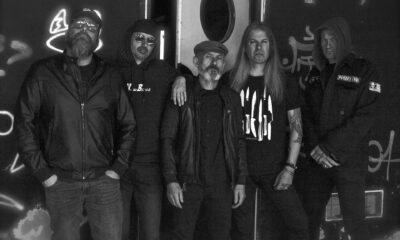
 Alternative/Rock2 weeks ago
Alternative/Rock2 weeks agoDeath Wishlist Are Fiery and Fierce with Their “I Get Bored” Video Premiere



